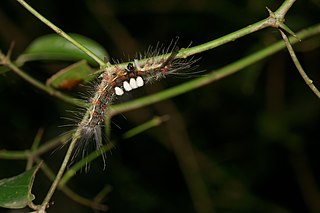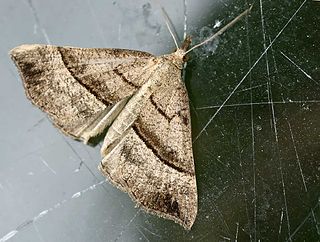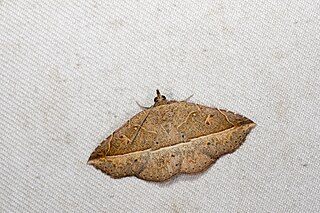
The Lymantriinae are a subfamily of moths of the family Erebidae. The taxon was erected by George Hampson in 1893.

The Calpinae are a subfamily of moths in the family Erebidae described by Jean Baptiste Boisduval in 1840. This subfamily includes many species of moths that have a pointed and barbed proboscis adapted to piercing the skins of fruit to feed on juice, and in the case of the several Calyptra species of vampire moths, to piercing the skins of mammals to feed on blood. The subfamily contains some large moths with wingspans longer than 5 cm (2 in).

The Hypeninae are a subfamily of moths in the family Erebidae. The taxon was first described by Gottlieb August Wilhelm Herrich-Schäffer in 1851. A notable species is Mecistoptera griseifusa, which lives solely on tears it drinks with its proboscis.
Mursa is a genus of moths of the family Erebidae.
Aglaonice is a genus of moths of the family Erebidae. The genus was described by Möschler in 1890.
Bandelia is a genus of moths of the family Erebidae.
Cecharismena is a genus of moths of the family Erebidae. The genus was erected by Möschler in 1890.
Janseodes is a monotypic moth genus of the family Erebidae erected by Pierre Viette in 1967. Its only species, Janseodes melanospila, was first described by Achille Guenée in 1852. It is found in India, South Africa and the US state of Florida.

Isogona is a genus of moths of the family Erebidae. The genus was erected by Achille Guenée in 1852.
Euaontia is a genus of moths of the family Erebidae.

Gondysia is a genus of moths in the family Erebidae.
Hemeroplanis is a genus of moths of the family Erebidae. The genus was erected by Jacob Hübner in 1818.
Homocerynea is a monotypic moth genus of the family Erebidae. Its only species, Homocerynea cleoriformis, was found in the US state of Arizona. Both the genus and species were erected by William Barnes and James Halliday McDunnough in 1913.

Laspeyria is a genus of moths of the family Erebidae erected by Ernst Friedrich Germar in 1810.

Metalectra is a genus of moths of the family Erebidae described by Jacob Hübner in 1823.
Parahypenodes is a monotypic moth genus of the family Erebidae. Its only species, Parahypenodes quadralis, the masked parahypenodes moth, is found in the Canadian province of Quebec. Both the genus and species were first described by William Barnes and James Halliday McDunnough in 1918.
The Boletobiinae are a subfamily of moths in the family Erebidae, containing about 956 species. The taxon was described by Achille Guenée in 1858.
The Cocytiini are a tribe of moths in the family Erebidae. Adults of some members of the subfamily, especially in the genus Serrodes, have a proboscis capable of piercing fruit skins, allowing the moth to drink the fruit juice.

Condate angulina is a moth in the family Erebidae. It is found in Asia, with records from India, Bangladesh, Malaysia, Taiwan, Borneo, and Thailand. It is a small moth, though larger than its congeners.
Condate arenacea is a moth of the family Erebidae first described by Francis Walker in 1865. It is found in Sri Lanka and Australia.








